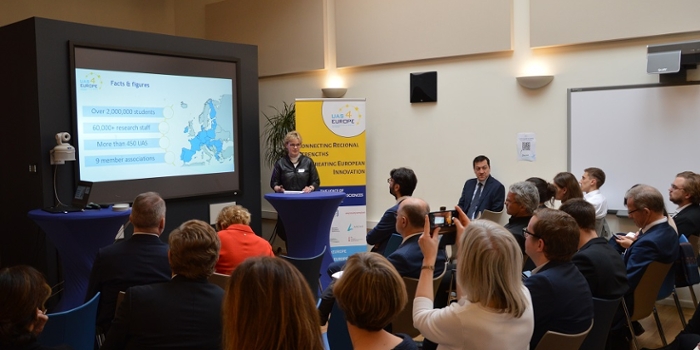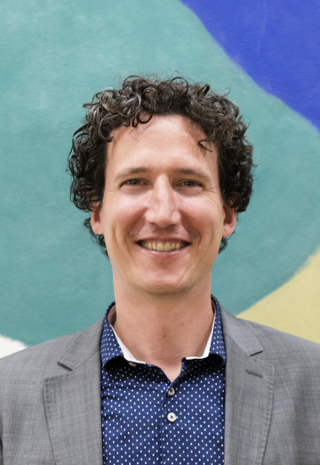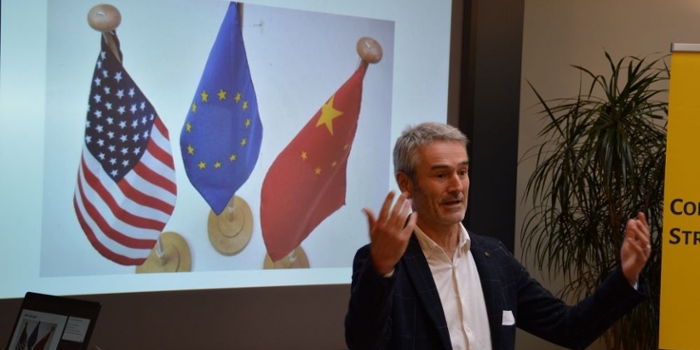AUAS AI research showcased in European innovation paper
UAS4EUROPE paper positions universities of applied sciences as major drivers of innovation in Europe
5 Dec 2022 13:23 | CommunicationThe Amsterdam University of Applied Sciences (AUAS) and its peers across Europe have a key role to play in helping the European Commission (EC) achieve its innovation goals. This is the message of a high profile UAS4EUROPE paper that showcases AUAS’s Centre of Expertise on Applied AI as one of seven best practices in building innovation networks.
China and the United States are currently at the forefront of innovation globally. The European Commission is on a mission to change this. This summer it unveiled the European Innovation Agenda (EIA) , a plan that aims to position Europe as an innovation powerhouse.
UAS4EUROPE, a network representing some 450 universities of applied sciences across Europe, sees a clear role for itself in executing the EIA. Published this week, the paper ‘A UAS’ers guide to building innovation ecosystems ’ explains why and how UAS can contribute. Innovation ecosystems are dynamic networks of knowledge institutions and public and private sector stakeholders working collaboratively on innovation and technology development.

Best practice: CoE Applied AI
The AUAS was closely involved in the creation of the paper, which was presented to the EU in Brussels during a networking event on 29 November. The Centre of Expertise Applied Artificial Intelligence (CoE AAI) was selected as an example of how UAS effectively engage with stakeholders in their regions and beyond, acting as key players in enabling SMEs to navigate the digital transition. The AUAS’s Frank Kresin, Dean of the Faculty of Digital Media and Creative Industries, and Maren Pannemann, LEAR and EU Liaison at IXA also provided their expertise as members of the UAS4EUROPE Innovation Expert Group.
What is a Centre of Expertise? Close collaboration with communities and diverse stakeholders is at the heart of research and innovation at AUAS. This comes to life through seven multidisciplinary Centres of Expertise (CoEs) at AUAS. They are breeding grounds for innovation, places where knowledge institutions such as AUAS work closely with the business community and the government, collaborating closely to find solutions to metropolitan and social issues. Research, education and professional practice are closely intertwined at AUAS and in its CoEs. This model is characteristic of research at universities of applied sciences in the Netherlands, where there are currently 59 Centres of Expertise across the country.

Lab approach
Geert Wissink, Programme Manager at CoE AAI, explains in the paper how the CoE AAI works, both within the AUAS and with the wider community:
“The whole programme is built on the different innovation ecosystems of the departments as in each of them exists an independent so-called LAB, where research is conducted at the interface between AI and the corresponding area of application”. These LABs are long-term collaborations between research groups, degree programmes and external partners such as commercial businesses, NGOs, the government and academic institutions. The core team of CoE AAI brings them all together and, as Wissink describes it, “guarantees the matching of use cases, technology companies and the regional and AI landscape”.
For example, AUAS was approached by the municipality of Amsterdam, which lacked data about the condition of their city streets. The CoE AAI then brought together De Fietskoerier Amsterdam, a company that delivers goods with cargo bikes, and Sonarski, a company that developed a LiDAR technology that can scan environments and assets in 3D. These companies then integrated the LiDAR technology into the cargo bikes. They then provided the data to the city of Amsterdam in a very timely and energy-efficient manner to solve their data problem through 3D mapping.
Read the full interview with Geert Wissink on pages 12 – 14 of the paper.

UAS impact: quantitative and qualitative
The paper is structured in two parts. A quantitative chapter sheds light on the tangible effect that UAS have on the innovation activities within their regions, looking at the indicators intellectual property, entrepreneurship and R&D services to regional economies.
In the qualitative chapter, seven concrete best practices from across Europe demonstrate how UAS engage with stakeholders in their regions and beyond. AUAS’s CoE is included here, alongside examples such as university alliances and networks for open collaboration, to digital innovation hubs on the ground in Austria, Finland, Germany and Switzerland, to name a few.
During the presentation of the paper on 29 November, the UAS4EUROPE network discussed the practical implications of the European Innovation Agenda with several influential guests, including Tudor-Trestieni Ion, Head of Sector Researchers and Research Careers at the Directorate-General for Research and Innovation, European Commission; Dr Heidi Fagerholm, Vice-Chair of UAS4EUROPE and CEO of Oulu UAS; and Pirita Lindholm, Director of ERRIN (The European Regions Research and Innovation Network).
Developments in AI and Data Science have raised many questions in the government, in businesses and in the public debate. This includes questions related to education and talent, as well as societal, social, ethical and technical questions. How do we want to shape AI in society? How can we design solutions that are actually adopted by professionals?
The Centre of Expertise Applied Artificial Intelligence (CoE AAI) addresses these questions by putting the scientific AI technology into practice in meaningful applications. It joins forces in an ecosystem of education, research, commercial businesses, non-profit organisations, government and academic institutions. In this way it links the applied research and education of the AUAS to issues faced by businesses and organisations.
CoE AAI actively contributes to the knowledge and development of methods to integrate data and AI in organisations, degree programmes and society in a meaningful way. It has roots in the Amsterdam Metropolitan Area and is therefore part of a strong innovative business network. It works closely with the University of Amsterdam, VU Amsterdam and the Centre for Mathematics & Computer Science in the coalition AI Technology for People.
In a nutshell: the CoE AAI works on AI solutions with today’s professionals and prepares the professionals of the future for the digital transition.
Find out more at amsterdamuas.com/appliedai
UAS4EUROPE aims to strengthen the voice of universities of applied sciences (UAS) in Europe in the field of applied research and innovation. It is a networking platform for exchanging knowledge and for reaching out to European research and innovation stakeholders to ensure a better integration and visibility of UAS in Europe’s research and innovation policies and programmes.
UAS4EUROPE represents over 2 million students and 60,000 research staff, spanning over 450 universities of applied sciences from 24 European countries.

